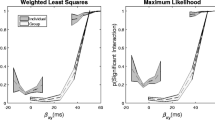Abstract
Singh et al. ([13]) pointed out that the Randomized response (RR) technique proposed by Moors ([9]) is not desirable because it fails to protect the confidentiality of the respondents and they provided two alternative strategies free from the above drawback but limited to SRSWOR sampling only. In this paper, generalization of one of the strategies is provided for complex survey designs, wider class of estimators and for quantitative characteristics. Relative efficiency of the modified strategy is tested through empirical investigations.
Similar content being viewed by others
References
Franklin, L.A. A comparison of estimators for randomized response sampling with continuous distribution from dichotomous populations.Commun. Statist. Theory. Methods 18 (1989) 489–505.
Greenberg, B.D., Abul-Ela, A.L.A., Simmons, W.R., Horvitz, D.G. The unrelated question randomized response model: Theoretical framework.J. Amer. Statist. Assoc. 64, (1969) 520–539.
Horvitz, D.G., Shah, B.V., Simmons, W.R. The unrelated question randomized response model.Proceedings of Social Statistical section, Amer. Statist. Assoc. (1967) 65–72.
Kim, J.I. Randomized response technique for surveying human populations.Ph.D. Dissertation, Temple University, Philadelphia, USA (1978).
Kuk, A.Y.C. Asking sensitive question indirectly.Biometrika 77, (1990) 436–438.
Mahmood, M., Singh, S. and Horn, S. On the confidentiality guaranteed under randomized response sampling: A comparison with several new techniques.Biom. J. 40, (1998) 237–242.
Mangat, N.S., Singh, R. An alternative randomized response procedure.Biometrika 77, (1990) 349–442.
Mangat, N.S., Singh, R. and Singh, S. Violation of respondent's privacy in Moor's model-its rectification through a random group strategy.Commun. Statist. Theory. Methods 26, (1997) 743–754.
Moors, J.J.A. Optimization of the unrelated question randomized response model.J. Amer. Statist. Assoc. 66, (1971) 627–629.
Raghavrao, D. On estimation problem in Warner's randomized response techniques.Biometrics 34, (1978) 87–90.
Singh, S. An addendum to the confidentiality guaranteed under randomized sampling by Mahmood, Singh and Horn.Biom. J. 48, (1999) 955–966.
Singh, S.Advanced Sampling Theory with Applications: How Micheal ‘Selected’ Amy (Kluwer Academic Publishers, The Netherlands, 2003).
Singh, S., Singh, R., Mangat, N.S. Some alternative strategies to Moor's model in randomized response sampling.J. Statist. Plann. Inference. 83, (2000) 243–255.
Rao, J.N.K., Hartley, H.O., Cochran, W.G. A simple procedure of unequal probability sampling without replacement.J. Roy. Statist. Soc. B. 24, (1962) 482–491.
Tracy, D.S. and Mangat, N.S. Respondent's privacy hazards in Moor's randomized response model—A remedial strategy. Int. J. Math. & Statist. Sci.,4 (1995), 121–130.
Warner, S.L. Randomize response: a survey technique for eliminating evasive answer bias.J. Amer. Statist. Assoc. 60, (1965) 63–69.
Author information
Authors and Affiliations
Additional information
An erratum to this article is available at http://dx.doi.org/10.1007/s00362-006-0339-2.
Rights and permissions
About this article
Cite this article
Arnab, R., Dorffner, G. Randomized response techniques for complex survey designs. Statistical Papers 48, 131–141 (2007). https://doi.org/10.1007/s00362-006-0319-6
Received:
Revised:
Issue Date:
DOI: https://doi.org/10.1007/s00362-006-0319-6




